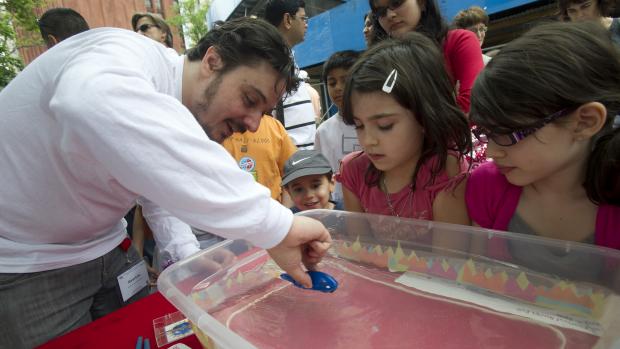Robotic Surf and Turf: Land and Aquatic Robots Show Students the Power of Engineering
NYU-Poly Robot-Control iPhone Apps, Robotic Fish and Anxiety-Reducing Math Video Game to be Featured at 2nd USA Science and Engineering Festival

A mobile application that makes controlling a robot as simple as speaking into an iPhone is one of only 16 research projects chosen by the National Science Foundation (NSF) for its exhibit at the 2nd USA Science and Engineering Festival. This is the second year that the NSF selected research from the Polytechnic Institute of New York University (NYU-Poly) Mechanical and Aerospace Engineering Department to exhibit during the nation’s largest celebration of science and engineering.
The app is one of many that NYU-Poly researchers are developing to help robots improve everyday life. Vikram Kapila, the NYU-Poly professor who leads the app project, explains that “if robots are to be pervasive, they will have to be easy to use.”
“The iPhone and Apple’s other mobile devices are so intuitive that children and adults alike don’t need instructions to use them,” he says. “Couple that with their built-in sensors, and you have the perfect platform upon which to build interfaces to interact with robots.”
Kapila and his team’s apps include ones for mobile ground robots and lab equipment such as an arm-like manipulator and a model helicopter. Their sights are set on apps for people with disabilities, like a voice-commanded wheelchair controller. For resource-strapped schools, they want to create alternatives to expensive laboratory hardware. Kapila’s research team includes not only engineering students but also primary- and secondary-school teachers who conduct research at NYU-Poly during summers under a Research Experience for Teachers (RET) Site project funded by NSF. The NYU-Poly apps will be displayed in the NSF exhibit in booth 904 of Hall C in the Washington, D.C., Convention Center.
Visitors to the festival on April 28 and 29 will get their hands on robots that NYU-Poly researchers created for the water, too.
Robotic fish will demonstrate how different body, tail and fin proportions affect swimming performance. The fish are part of research that Maurizio Porfiri, an NYU-Poly associate professor of mechanical and aerospace engineering, is conducting under an NSF Career grant to learn how robotic fish can mimic natural movements of leader fish. Researchers could potentially use the knowledge to create robots to lead schools of fish away from hazards like oil spills.
At the same booth 3544 in Hall A of the Washington Convention Center, players of the video game “Scoop!” will learn about a different type of control: body gestures. They will move their hands and bodies to position digital ice cream cones to catch falling fractions in the form of ice cream scoops.
Katherine Isbister, associate professor of computer science and engineering and director of NYU-Poly’s Game Innovation Lab, developed “Scoop!” with collaborators in the Microsoft Research-supported Games for Learning Institute, housed at NYU. They are using it to explore how game designers can incorporate power poses to reduce learners’ math anxiety. Research shows that power poses — expansive versus contracted body positions — promote confidence.
Magued Iskander, an NYU-Poly professor of civil engineering, will assist visitors at a display of robot activities originating from NYU-Poly’s GK-12 Fellows project funded by NSF and six philanthropic organizations. The GK-12 Fellows project falls under the auspices of NYU-Poly’s Center for K-12 Science, Technology, Engineering and Math (STEM) Education, which is led by Ben Esner. The center’s programs help K-12 teachers implement engaging STEM curriculum. Among the activities will be a LEGO-based robot with changeable feet that reveal how biological creatures adapt to environmental changes as well as a LEGO-based game of rock-paper-scissors.
The Science Festival Book Fair selected NYU-Poly doctoral candidate Dustyn Roberts to be among the 36 best selling STEM K-12 authors who will give 45-minute presentations followed by book signings. The traditionally trained engineer with a decidedly non-traditional bent has launched a rocket in Africa, worked for artists and NASA’s Mars Science Laboratory mission. She will speak at the Family/Hands On Science Stage (Street Level Room 145AB) on Sunday, April 29, at 1:40 p.m. and sign her book, Making Things Move: DIY Mechanisms for Inventors, Hobbyists, and Artists, at 3 p.m.
NYU-Poly’s GK-12 Fellows project to engage pre-college students in STEM education is synergistically supported by the Central Brooklyn STEM Initiative, a partnership with The Black Male Donor Collaborative, the Brooklyn Community Foundation, J.P. Morgan Chase Foundation, XEROX Foundation, NY Space Grant Consortium and White Cedar Fund.




